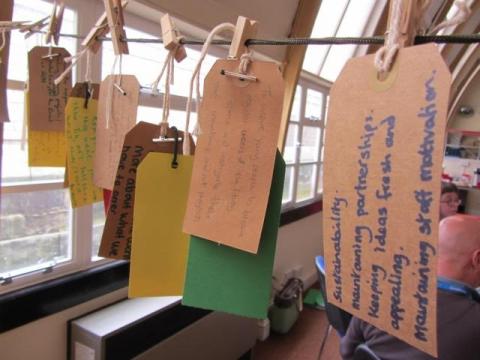Create Gloucestershire is a consortium of arts and cultural organisations and individuals working together to make arts ‘everyday’ for local people. This case study forms part of the Different delivery models – commissioning culture and arts section of our online Culture Hub.
In 2011, faced with budget cuts, Gloucestershire County Council was looking for options to maintain the county’s arts and culture offer while reducing its financial contribution. A group of local arts and culture leaders set up Create Gloucestershire (CG) and discussed options to oversee arts and cultural provision using start-up funding from the council (namely the arts development budget, which had previously been used to fund key arts providers and a small team, reduced by 30 per cent).
This was agreed, with the funding in place for three years, after which CG would need to be self-sustaining. CG began to design and deliver a programme of capacity building, leadership training, evaluation, fundraising and business development. It brings together individuals and organisations to share expertise and resources, engage with commissioners and diversify income streams. Membership is open to anyone in the sector, creating a pool from which partnerships can come together and bid for funding.
During the initial period, CG established alternative sources of income (which still include significant county council resources, but not from an arts and culture budget). As an independent organisation, it is able to raise charitable funds and income from alternative sources. At a district level, it is supporting emerging cultural strategies for Gloucester, Forest of Dean, Stroud and Cheltenham councils, which do still provide funding for arts and culture.
CG’s approach to arts and cultural development is grassroots-up and underpinned by collaboration. It has been successful in growing investment, especially from non-arts sources. Secured funding is distributed across its members to pilot and test new ways of thinking about, planning and delivering arts and culture. This has led to new projects in libraries, GP surgeries, schools, day care settings and housing estates.
Impact of the activity
CG has more than 180 members and associate members, knitting the arts and cultural sector together to provide a more coherent offer for audiences, policy makers and funders. Working with a range of strategic partners it creates, researches, tests and shares ideas and projects in response to social, cultural and economic needs. CG does not ‘run’ services – its job is to ensure the right conditions are in place for arts and culture to thrive, using funding from sources including Arts Council England, charitable trusts and member contributions. Core funding supports a light touch central team, with the rest distributed to members and partners to deliver specific projects.
Pippa Jones, Director, said:
We enable our members to deliver and provide the infrastructure to make collaboration possible. CG is seen as a portal to the arts and cultural sector, making commissioning more cost-effective and impactful as we can curate partnerships to ensure a really good match with funder/commissioner priorities. Small, diverse organisations can have a voice through CG – as relevant for philanthropy as for cultural commissioning.
Looking to the future
CG will continue to test new business models and strategic partnerships. Current projects include:
- Art of Libraries: CG is rolling out a change programme in six early adopter libraries, developing libraries as hubs for introducing art and culture to children and young people, especially those not engaged with the sector.
- Whole Schools Change: Working with Active Gloucestershire (the county sports partnership), CG is piloting work in three schools to improve pupils’ health and wellbeing by integrating arts, culture, physical activity and pastoral support into the heart of the school community to address increasing levels of self-harm and eating disorders.
Key learning points
- Collaboration allows people and organisations to do things they could not do on their own; however, not all activity benefits from a collaborative approach.
- Changing business models takes time and trust. ‘Quick wins’ are needed to convince people it is worth the extra effort, but these need to be delivered within the context of a long-term vision.
- Shared data collection and analysis is vital to both prove the impact and improve the cultural sector.
For further information contact Pippa Jones, Director, Create Gloucestershire: [email protected]
This case study have been developed in conjunction with Arts Council England.


